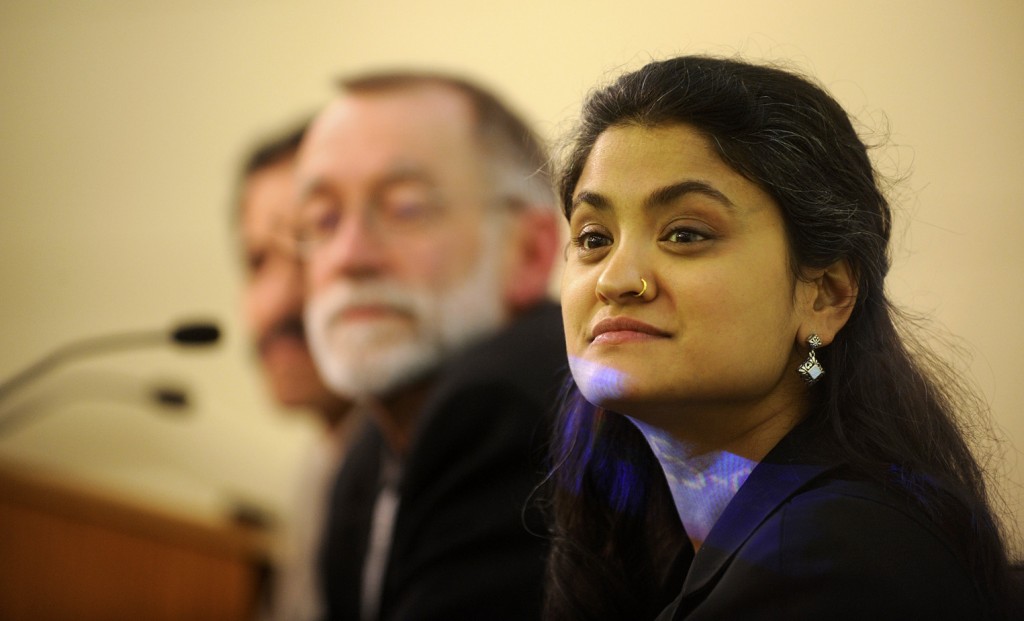When the mother of a young man who murdered his girlfriend in Florida contacted restorative justice pioneer Howard Zehr for assistance in 2010, Zehr did what he typically does in such cases: he got in touch with someone he has mentored, someone he knew would be qualified to help.
That person was Sujatha Baliga, a lawyer and restorative justice practitioner in California, who had taken an advanced restorative justice class at the 2009 Summer Peacebuilding Institute of Eastern Mennonite University (EMU), where Zehr carries the title of “Distinguished Professor.”
Baliga initially hesitated to take the case. ”I do a diversion program in Oakland, Calif., with kids who have committed burglaries and assaults,” Baliga told the Tallahassee Democrat for an article published Aug. 28, 2011. “I didn’t think we’d be able to pull this off in this case.”
After learning that the parents of the victim and offender were already interacting with each other on a cordial basis, Baliga agreed to do something almost without precedence. With Zehr playing a behind-the-scene advisory role, she facilitated a plea conference of all the main stakeholders in the murder situation, in which they discussed the sentence to be faced by the murderer.
On June 22, 2011, Baliga convened, among others, the assistant state attorney in charge of prosecuting the crime, the defense attorney, and the four parents left bereaved by the murder – the mother and father of the victim, 19-year-old Ann Grosmaire, and the mother and father of the young man, 20-year-old Conor McBride, who shot Ann at the end of days of highly emotional bickering.
The meeting arranged by Baliga eventually resulted in something much different than the usual death penalty or life sentence in such cases in Florida. It resulted in a 20-year sentence, plus 10 years of probation, for Conor, who participated in the face-to-face meeting. The session proved to be a step towards healing and a sense of peace for the family members.
More than a year after the Tallahassee Democrat article, the New York Times Magazine published a lengthy feature on the case on Jan. 4, 2013. The Today Show jumped onto the story a few days later, broadcasting an interview with both sets of parents.
Titled “Can Forgiveness Play a Role in Criminal Justice?” the NY Times piece (and then Today) played up the forgiveness aspect of the case – the Grosmaires spoke of how their Christian faith and their sense of what Ann would have wanted led them to forgive Conor and even to visit him in prison. They have also maintained their friendship with his parents.
Yet, Zehr’s philosophy of restorative justice – shared by Baliga – does not put forgiveness at the center of the process. Instead it stresses the importance of addressing these questions: What harm was done and by whom? What needs have arisen as a result of that harm? Whose obligation is it to meet those needs?
Forgiveness may emerge as these questions are addressed, but it is not a necessary outcome for restorative justice to be effective, says Zehr.
Baliga, who directs the Restorative Justice Project at the National Council on Crime and Delinquency, and Zehr are joining forces on Jan, 30, 4:30-6 p.m. in U.S. Eastern Standard Time, to hold a webinar about this case with restorative justice practitioners around the world. The registration fee for participants is $10. (Registration opened on Mon., Jan. 14, with a limit of 500 registrants)
They will be exploring: How did this case unfold? What can restorative justice practitioners learn from this pioneering case? What is the relationship between forgiveness and restorative justice? How do we relate to the media on these issues?
Viewers will be able to submit comments and questions through a chat forum. The event is the first official one of the newly formed Zehr Institute for Restorative Justice.
Zehr says the webinar is intended for restorative justice practitioners but is open to anyone, though a basic knowledge of restorative justice is preferred. For those without that background, The Little Book of Restorative Justice by Zehr can provide a basic understanding.

If only the entire justice system worked this way… instead of retaliating. Scandinavian criminal justice incorporates some of these principles, but the conservative so-called christians that make up the right wing, and the prosecutors with hard hearts are bent on punishing anyone and everyone. it’s medieval. thanks to Zehr and all his proteges.
How can one register for the webinar?
The link to the registration is now active and available in the text above.
Thanks!
This will be interesting. As I understand it, the homicide occurred when the perp was under a tremendous amount of emotional instability. Yet, he still got 20 years. I realize that RJ is not the same as “forgiveness,” but I look forward to hearing how the prosecutor believes that 20 years in the joint will help anyone “restore.”